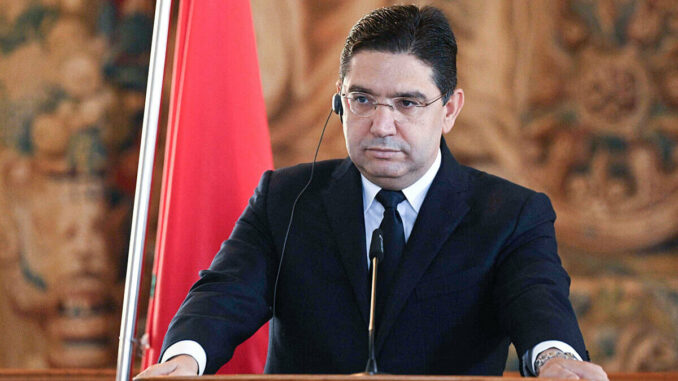
Morocco has welcomed the adoption, on Thursday, of resolution 2756 of the UN Security Council, extending MINURSO’s mandate until October 31, 2025, the Ministry of Foreign Affairs, said in a statement.
This resolution comes in a context marked by the irreversible trajectory set by King Mohammed VI on the issue of the Kingdom’s territorial integrity, through the growing support of permanent members of the Security Council and influential countries for Morocco’s sovereignty over the Sahara and the Moroccan Autonomy Initiative, and the continued withdrawal of recognition of the pseudo “SADR,” the Ministry said.
“The resolution, adopted today, preserves all Morocco’s achievements, while introducing new important elements for the issue’s future development within the UN,” the statement stressed.
Actually, the new text enshrines the framework, the parties involved, and the aim of the political process. As such, the Council re-established that roundtable talks are the only framework for a political solution to the regional conflict over the Moroccan Sahara.
Moreover, the resolution clearly identifies the parties to the dispute, notably Algeria, which is mentioned in the resolution as many times as Morocco. Similarly, the Security Council reaffirms that the political solution can only be realistic, pragmatic, lasting and based on compromise, cardinal elements of the Moroccan Autonomy Initiative, whose pre-eminence has been reaffirmed.
Resolution 2756 also enshrines two important developments that bolster the Kingdom’s position.
First of these developments lies in the fact that the Council “welcomes the recent momentum and urged for building on it.”
As a result, the Council endorses the international momentum on the Moroccan Sahara issue under the impetus of the King, in favor of Morocco’s sovereignty over the Sahara and the Moroccan Autonomy Initiative, the statement added, noting that from now on, UN action can only be part of this momentum.
As regards the second development, the Security Council calls the other parties “to avoid acts which could compromise the political process,” the Ministry said, noting that the Council thus echoes the Kingdom’s clear official position, stressing that there can be no political process without respect for the ceasefire.
Noting that the resolution was adopted by 12 votes in favor, 2 abstentions and the non-participation of the neighboring country, a non-permanent member of the Security Council, the statement emphasized that this non-participation demonstrates the isolation of this country’s position within the Security Council and the international community in general. It also blatantly reveals its contradictions: it claims to defend international legality, Security Council resolutions, and UN efforts, while it refuses to support these same efforts and clings to an obstructionist logic.
